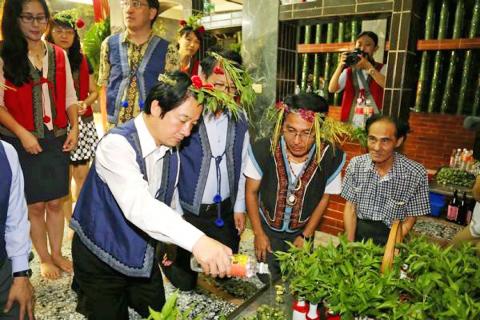The government yesterday approved a proposal to recognize Pingpu Aborigines as indigenous peoples, by amending the Status Act For Indigenous Peoples (原住民身分法) to restore their identity, and linguistic and cultural rights, in accordance with a policy of transitional justice advanced by President Tsai Ing-wen (蔡英文).
The decision to create a new community, known as Pingpu Indigenous People, was announced yesterday by the Executive Yuan following a meeting on policies and status laws regarding Pingpu communities, with deliberations by government officials, academics and representatives of Pingpu communities.
Some Pingpu leaders welcomed the news, hailing it as a “historic decision” for the government to finally recognize Pingpu communities as Taiwanese indigenous peoples, adding that it would open a new era for justice and equality for all the major ethnic and cultural groups in Taiwan.

Photo courtesy of the Tainan City Government
“We are very happy that the Executive Yuan pushed forward on this policy. It is time for Pingpu communities to regain their indigenous status, which they had possessed in the past. On behalf of the Pingpu Siraya community in Tainan City, I want to thank the central government for respecting the right to self-identity and for the recognition of their indigenous status,” Tainan Mayor William Lai (賴清德) said. “This is the first time we have had a positive response from the government on this issue, after decades of struggling and campaigning.”
“However, there is more work to do to promote the cultural identities and traditions of Pingpu communities to restore and protect their rights the same as those of other recognized indigenous peoples,” he added.
Other Pingpu campaigners said that there are still protracted negotiations and hard bargaining to be done with the Council of Indigenous Peoples (CIP) in the years to come, as the proposal requires an itemized examination of the Indigenous Peoples Basic Act (原住民族基本法) on affected rights and applications of Pingpu communities, after the process of amending the Status Act For Indigenous Peoples (原住民身分法).
There has been opposition to the recognition of some Pingpu communities as indigenous peoples to limit their privileges and rights, and government subsidies given to 16 of the recognized Aboriginal groups, activists said.
Pingpu Papora youth campaigner Aidu Mali from central Taiwan said her youth organization has been deliberately excluded from meetings between the Executive Yuan and the CIP over the past year.
“The proposal to create another category as ‘Pingpu Indigenous People’ was not what we fought for. It only gives us a superficial title and we fear that the CIP will work hard to stall on granting any indigenous rights. In the end, we could be denied our rights and excluded from the system again,” she said.
Ketagalan community Pingpu rights campaigner Chen Kimman (陳金萬) said that although he welcomed the development, he also warned that CIP officials, in their own self-interest, had chosen not to grant indigenous status to Pingpu communities, but had deliberately drawn out the process with legal amendments and protracted negotiations, which could drag on for many years and could be impeded by politicians and special-interest groups.

Alain Robert, known as the "French Spider-Man," praised Alex Honnold as exceptionally well-prepared after the US climber completed a free solo ascent of Taipei 101 yesterday. Robert said Honnold's ascent of the 508m-tall skyscraper in just more than one-and-a-half hours without using safety ropes or equipment was a remarkable achievement. "This is my life," he said in an interview conducted in French, adding that he liked the feeling of being "on the edge of danger." The 63-year-old Frenchman climbed Taipei 101 using ropes in December 2004, taking about four hours to reach the top. On a one-to-10 scale of difficulty, Robert said Taipei 101

Taiwanese and US defense groups are collaborating to introduce deployable, semi-autonomous manufacturing systems for drones and components in a boost to the nation’s supply chain resilience. Taiwan’s G-Tech Optroelectronics Corp subsidiary GTOC and the US’ Aerkomm Inc on Friday announced an agreement with fellow US-based Firestorm Lab to adopt the latter’s xCell, a technology featuring 3D printers fitted in 6.1m container units. The systems enable aerial platforms and parts to be produced in high volumes from dispersed nodes capable of rapid redeployment, to minimize the risk of enemy strikes and to meet field requirements, they said. Firestorm chief technology officer Ian Muceus said

MORE FALL: An investigation into one of Xi’s key cronies, part of a broader ‘anti-corruption’ drive, indicates that he might have a deep distrust in the military, an expert said China’s latest military purge underscores systemic risks in its shift from collective leadership to sole rule under Chinese President Xi Jinping (習近平), and could disrupt its chain of command and military capabilities, a national security official said yesterday. If decisionmaking within the Chinese Communist Party has become “irrational” under one-man rule, the Taiwan Strait and the regional situation must be approached with extreme caution, given unforeseen risks, they added. The anonymous official made the remarks as China’s Central Military Commission Vice Chairman Zhang Youxia (張又俠) and Joint Staff Department Chief of Staff Liu Zhenli (劉振立) were reportedly being investigated for suspected “serious

Nipah virus infection is to be officially listed as a category 5 notifiable infectious disease in Taiwan in March, while clinical treatment guidelines are being formulated, the Centers for Disease Control (CDC) said yesterday. With Nipah infections being reported in other countries and considering its relatively high fatality rate, the centers on Jan. 16 announced that it would be listed as a notifiable infectious disease to bolster the nation’s systematic early warning system and increase public awareness, the CDC said. Bangladesh reported four fatal cases last year in separate districts, with three linked to raw date palm sap consumption, CDC Epidemic Intelligence